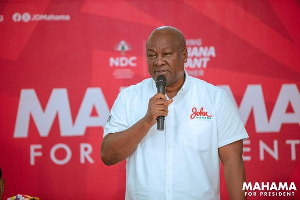In a world where gender equality remains a pressing challenge, the call for empowering women in leadership roles has never been more crucial. Former President John Mahama has emerged as a fervent advocate for gender parity in governance, recognising that true progress cannot be achieved without the active participation of women in political and decision-making processes. This article and some others will delve into Mahama's unwavering commitment to uplifting women's voices and ensuring their rightful place at the table.
From implementing policies aimed at increasing female representation in government to championing initiatives that support women's rights and opportunities, Mahama's vision reflects a transformative approach that seeks to create a more inclusive society. Please join me as I explore his vision to empower women in Ghana.
Gender parity in governance is not merely a concept; it's a transformative movement that seeks to ensure equal representation and participation of women in decision-making processes across all levels of government. The push for gender parity highlights the undeniable truth that diverse perspectives foster comprehensive and effective policies. When women are included in governance, the resultant policy-making reflects a broader spectrum of societal needs and experiences, ultimately leading to more equitable outcomes for all.
In recent years, the global dialogue surrounding gender parity has intensified, with numerous countries acknowledging the critical need to empower women as leaders, policymakers, and change-makers. The conversation has extended beyond mere representation to encompass the systemic barriers that hinder women's full participation in governance.
This includes addressing issues such as cultural biases, discriminatory practices, and lack of access to resources and opportunities. Mahama's commitment to gender parity in governance is a pivotal aspect of this discussion. Recognising that true progress is impossible without the active involvement of women, his vision is to champion initiatives aimed at dismantling these barriers.
Through targeted policies, mentorship programmes, and legislative reforms, Mahama envisions a future where women are not just participants in governance but are at the forefront, shaping policies that impact their lives and communities.This introduction sets the stage for a deeper exploration of the initiatives and strategies to be implemented under Mahama's leadership to promote gender parity.
It underscores the belief that empowering women is not just a moral imperative; it is essential for sustainable development and the overall progress of society. As I dig further into the specifics of Mahama's commitment, it will become clear that achieving gender parity in governance is a journey worth embarking on, one that promises to yield dividends for generations to come.
Opinions of Friday, 4 October 2024
Columnist: Anthony Obeng Afrane



















